Research
I am the primary writer of the bIoTope H2020 project proposal, under the excellent support of Prof. Kary Främling.
bIoTope H2020 project (2016-2019) 
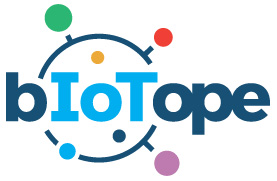
The Internet of Things (IoT) brings opportunities to create new services and products, reducing costs for societies, and changing how services are sold and consumed. Despite this, one of the most critical obstacles are the « vertical silos » that shape today’s IoT (cf. solid/black arrows in the below figure). Indeed, vertical silos constitute a serious impediment to the creation of cross-domain, cross-platform and cross- organisational services due to the lack of interoperability and openness.
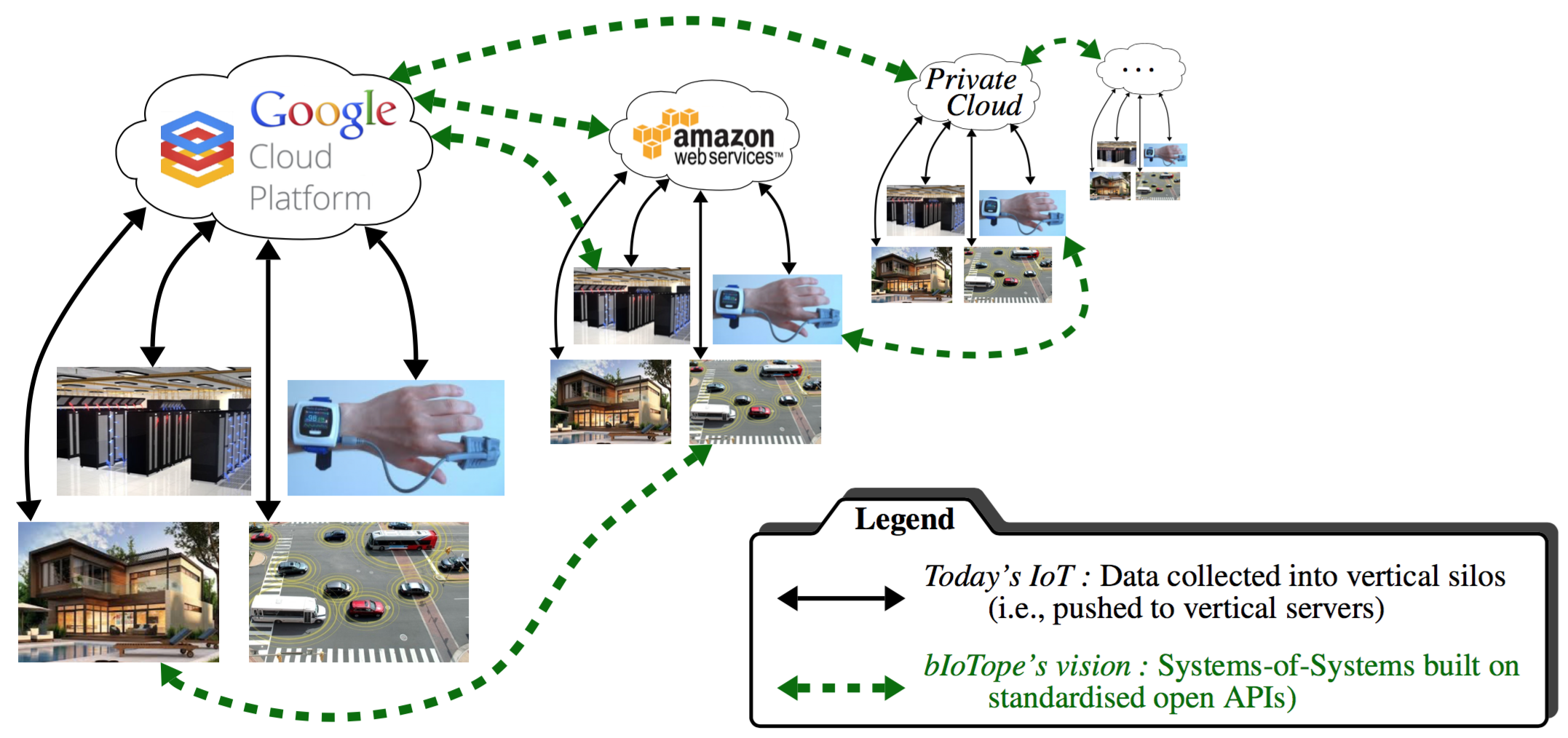
The upcoming H2020 bIoTope project (grant agreement n° 688203), standing for Building an IoT OPen innovation Ecosystem for connected smart objects, aims to lay the foundation for open innovation ecosystems, where companies can – with minimal investment – innovate by creating new Systems-of- Systems (SoS) platforms for connected smart objects (cf. dashed/green arrows in the above figure).
bIoTope Objectives
- Provide the necessary standardised Open APIs to enable horizontal interoperability between vertical silos;
- Enable new forms of co-creation of services ranging from simple data collection, processing, to context-driven, intelligent and self-adaptive support of consumers’ everyday work and life;
- Provide the necessary standardised Open APIs to enable horizontal interoperability between vertical silos;
- Establish a clear framework for security, privacy & trust that facilitates the responsible access, use, and ownership of data in the IoT;
- Develop large-scale pilots in smart cities to provide social, technical and business proofs-of-concept of bIoTope enabled-SoS ecosystems;
- To maintain, grow and sustain the socio-technical and business-wise bIoTope ecosystem, e.g. by establishing an end-to-end governance roadmap for ecosystem orchestration.
Universal Messaging Standards for the IoT
bIoTope enables the publication, consumption and composition of heterogeneous information sources and services from across various platforms, including OpenIoT, FI-WARE, bIoTope partner’s platforms (e.g., city dashboards), etc. To this end, bIoTope takes full advantage of recent Open API standards for the IoT (Främling, 2014), notably O-MI (Open Messaging Interface) (O-MI, 2014) and O-DF (Open Data Format) (O-DF, 2014), which can be extended with more specific vocabularies, e.g. using Semantic Web & Ontology technologies.
bIoTope Large-Scale Pilots
Two categories of pilots are defined to prove the effectiveness of the bIoTope SoS platform for IoT, namely:
- Domain-specific pilots: ensure innovation and exploitation impact through the involved bIoTope partners (e.g., through well-established customer networks);
- Cross-domain smart city pilots: provide concrete proofs-of-concept of horizontal interoperability scenarios in smart city environments.
A dozen of smart city pilots will be set up during the project (cf. figure bottom/left), implemented in three distinct cities/regions (cf. table below). In order to engage local developer communities, a set of Open Calls will be organized from June to December 2017 (visit us: http://www.biotope-h2020.eu).
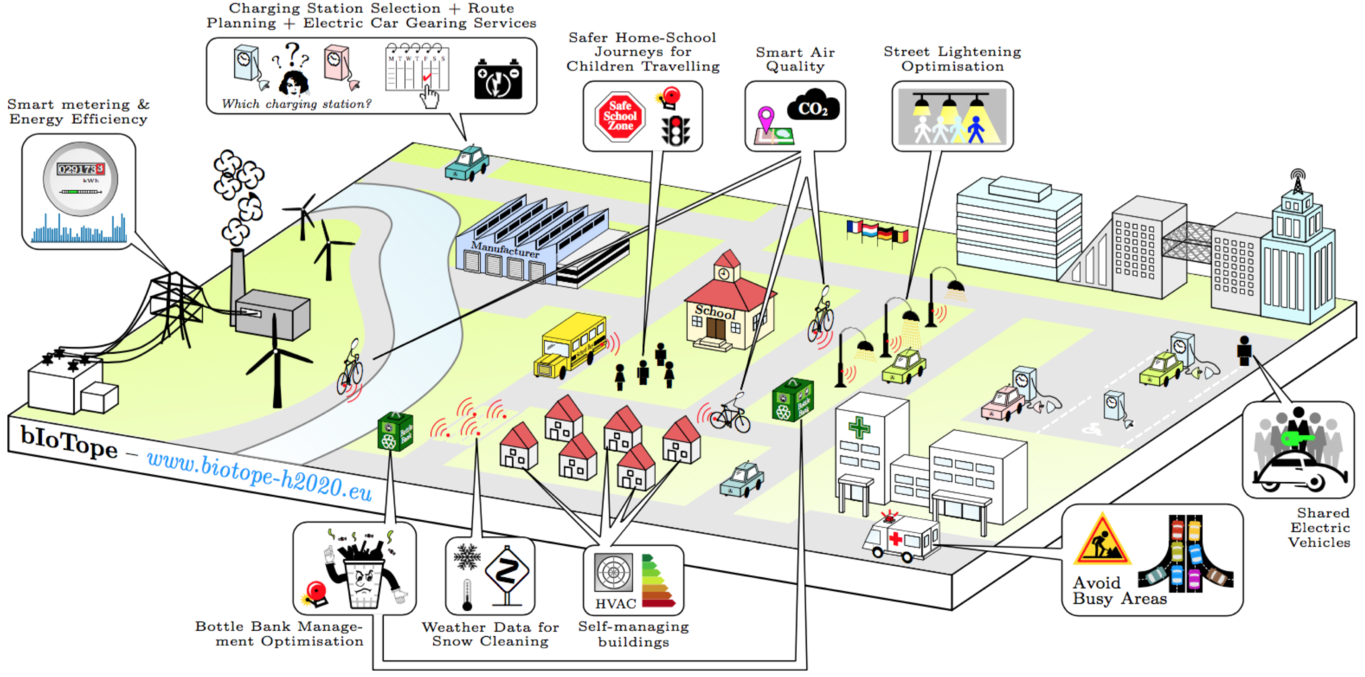
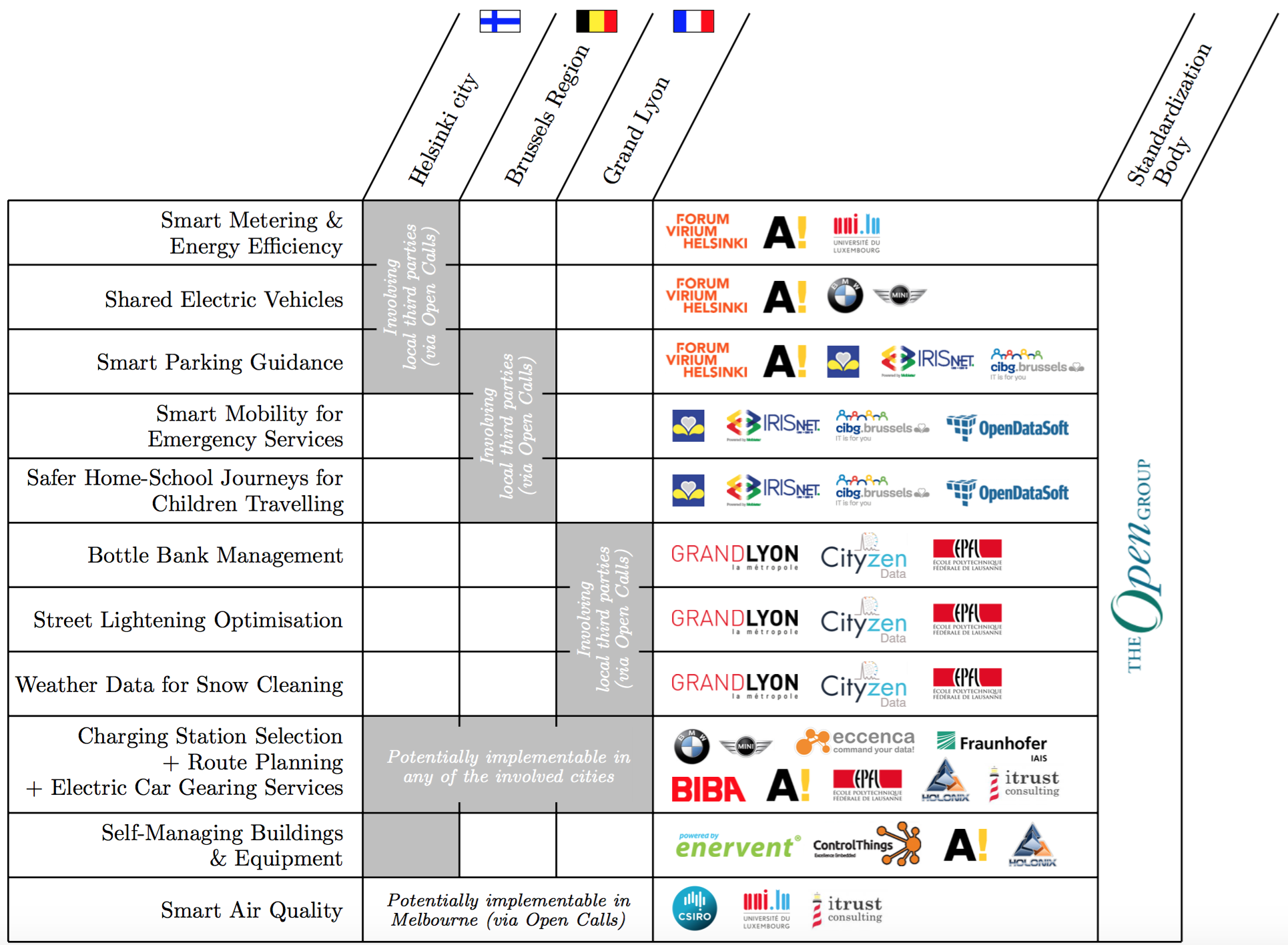
bIoTope Consortium
bIoTope involves 21 partners, from 9 different countries. The Scientific Coordinator is Prof. Kary Främling from Aalto University (kary.framling@aalto.fi)
The ASIA (Adaptive Systems of Intelligent Agents) team headed by Prof. Främling at the Aalto School of Science has been developing distributed software architectures for the Internet of Things (IoT) since 2000 and published some of the first scientific articles that explicitly mention the Internet of Things in 2002. Key technologies are semantic net storage, agent processing technologies, machine learning, message-oriented middleware and integration with existing industrial systems. With the DIALOG message-oriented agent middleware, the team was one of the first in the world to embrace the IoT concept, which has later been extended to areas such as « Intelligent Products » and the data storage and processing mechanisms related to them.
Need to talk about O-MI and O-DF…
Centre for Knowledge and Innovation Research (CKIR) at AALTO School of Business, founded in 1999, is an international and multidisciplinary research centre that promotes scientific research on knowledge- and innovation-based renewal and growth of companies and societies. CKIR coordinates the facilitation and support action for the 600 Million euro Future Internet PPP Program (FI-PPP), and facilitated the definition of IPR rules and open call definitions and rules to FIWARE and other FI-PPP projects. CKIR has acted as coordinator in several Future Internet Research (FIRE) CSA projects, developing rules of engagement, indicators and tools for community orchestration and mobility.
CKIR will contribute to the bIoTope project by developing and implementing the approach and framework for analysing the open IoT ecosystems in and across the different use cases. CKIR will further develop indicators for analysing the new business creation opportunities and scenarios in the established ecosystems. CKIR also has a pivotal role as the facilitator for the open calls to support the implementation of the use case pilots.
The Computer Aided Design and Production Laboratory (LICP) of the Institute of Mechanical Engineering of EPFL is involved in various fundamental and applied research projects in the areas of Sustainable Manufacturing and Closed-Loop Lifecycle Management in collaboration with Swiss and European industrial partners.
LICP will contribute in bIoTope with its strong experience in closed-loop lifecycle management, semantic modelling and reasoning for lifecycle engineering applications including methodologies and algorithms for data, information and knowledge extraction and transformation with context-awareness. Further activities in bIoTope include the (i) creation of new knowledge in the field of context-aware semantic modelling, context search and fusion of user and business context, and (ii) the exchange and improvement of knowledge in the filed of holistic lifecycle management through IoT infrastructure and smart devices.
The Interdisciplinary Centre for Security, Reliability and Trust (SnT), launched in 2009 by the University of Luxembourg, aims to become a European centre of excellence and innovation for secure, reliable, and trustworthy ICT systems and services. To date, SnT participated or actively works in more than 30 European projects funded through various programmes such as: FP7, CIP, H2020, ESA, EDA, etc. By the end of 2014, some 240 people (among which 89 Ph.D candidates) were active at the Centre.
SnT will conduct activities on IoT security and privacy, namely Context-driven Security and Privacy, Safe micro-billing for IoT, as well as big data aspects. To be completed…
The Fraunhofer Institute for Intelligent Analysis and Information Systems (IAIS) is the Fraunhofer Society’s « data institute » and one of the most renowned research institutions in the data science area, with an extremely strong track record in data mining, machine learning, semantic technologies, information retrieval and software engineering. In terms of infrastructure, IAIS has an Infiniband connected high-performance cluster with >600 cores and 400TB storage connected to a living lab, which it uses to develop big and linked data prototype systems.
Fraunhofer IAIS will lead in bIoTope « User Interaction Development & Adaptation » activities by applying media context query tehories so as to make UIs able to self-adapt their appearance and/or interaction behaviour to an individual user according to the user’s profile, behaviour, trust and reputation, or according to the object and city/street contexts. Fraunhofer IAIS will also contribute to Knowledge representation, discovery and extraction.
BIBA – Bremer Institut für Produktion und Logistik GmbH is an engineering research institute developing technical and organizational solutions for tasks from various areas of production technology as well as from other related scientific disciplines and puts them into practice both in SMEs as well as multinational companies. The institute is directly linked to the University of Bremen, Faculty of Production Technology. The facilities of the applied research institute BIBA include a wide branch of software and hardware related equipment, which can be flexible combined to enable technical simulations, industrial test beds and similar lab environments.
Within bIoTope, BIBA is responsible for eliciting and analysing requirements from all stakeholders of the bIoTope project, according to the envisaged value chains. In particular, requirements from infrastructure providers, application integrators, and application service providers will be analysed, which will make it possible to produce the main functional specifications for the bIoTope SoS platform and related service-provisioning models, as well as the definitive city pilots. In the same vein, BIBA will contribute to set up the framework for ex-ante and ex-post evaluation of the application and use case validations.
Commonwealth Science and Industrial Research Organisation (CSIRO) is Australia’s top government research agency that has over 5600 highly qualified researchers and developers in various areas of science and technology. CSIRO carries out multidisciplinary R&D concentrating on national priority areas. Digital Productivity Flagship (DPF) Research Group – involved in bIoTope is a CSIRO flagship focusing on Information and Communication Technologies. Autonomous Systems Program is developing robots and autonomous technologies (including IoT and sensor networks) that improve operating safety and efficiency, delivering customised solutions to industry.
IoT is an active research area at CSIRO since 2009 and is a strategic research direction for the next decade. CSIRO has made a major contribution to W3C de-facto standard « Semantic Sensor Network Ontology » (SSNO). Research group in IoT led by Prof A. Zaslavsky was actively involved in the FP7 OpenIoT project. Significant IoT expertise, capability and competence will contribute to the bIoTope Systems of Systems platform for IoT. Specifically, CSIRO will lead the work package dealing with « Context-Aware Service Provisioning for IoT ». Unique and considerable competence in context-awareness, semantic sensor networks, reasoning about context, mobile analytics and comprehensive knowledge of OpenIoT platform will make critically important contribution to bIoTope project.
The Open Group is a worldwide industry organisation with headquarters in the UK and has more than 400 members representing all of the largest system and software vendors, and many end user organisations including leaders in worldwide finance, aerospace, health care, automotive, utilities, commerce and telecommunications, which have combined technology purchase budgets in excess of €50 billion annually. The Open Group provides a vendor-neutral forum for buyers and suppliers of technology to agree technology evolution and interoperability, its Research Institute conducts advanced technology development for real-time and distributed systems, and its Enterprise architecture standards TOGAF® and Archimate® are widely adopted. The Open Group’s Platform 3.0 Forum addresses the evolution of platform technologies and standards that support the convergence of mobility, social networks and social enterprise, big data analytics, Cloud computing and the Internet of Things. The Open Group is a provider of industry standard open source technologies and verification frameworks for product certification and maintains the required platforms, tools and processes that support these activities.
In bIoTope, the Open Group will contribute to the industrial requirements analysis task, providing broad industry perspectives from its 400+ membership, and in particular addressing the open source requirements as an organisation with substantial experience providing open technologies widely used by industry. The Open Group will play a major role in the techno-economic evaluations of bIoTope applications, and in the communication and dissemination phases of the bIoTope results, e.g. by utilising its membership and quarterly international meetings, as well as contacts with many thousands of IT architects that have been certified by The Open Group. The Open Group will be lead the external collaboration and standardization governance activities, as well as all IPR-related aspects with the project technologies/partners and open data management.
BMW Group is a global manufacturer of premium class automobiles and motorcycles, covering the BMW, MINI and Rolls-Royce brands. In 2014 about 2118 Million automobiles and more than 123 000 motor cycles were built and sold worldwide at total revenues of approximately 80 Billion €. The BMW headquarters are located in Munich and main German production sites are located in Munich, Regensburg, Dingolfing, Leipzig, Berlin and Landshut. Beyond these German plants there are major production sites in Austria, South Africa, USA, Great Britain and China.
In bIoTope, BMW Group aims to offer its customers premium end-to-end mobility beyond the car. In 2014, about 2118 Million automobiles were built and sold worldwide at total revenues of approximately 80 Billion euros. The BMW Group’s vision is to further extend the currently offered « BMW ConnectedDrive » package based on the bIoTope SoS platform and associated ecosystem. Note that « BMW ConnectedDrive » is already well established and used by customers around the world every day. To this end, BMW is mainly involved in the Requirements analysis and Proof-of-Concept and brings its excellence in innovative function development and integration in the project. The car integration of the developed applications will be an important contribution to make it plainly and fully demonstrated to the customer. The goal is to offer better mobility services to customers by connecting cross-domain data: i) Identification and use of specific customer preferences for routing; ii) Prediction of customer activities to leverage electric mobility; and iii) Using extended real-time information about charging infrastructure.

eccenca GmbH was founded as a spin-off company of AKSW research group at the University of Leipzig and as a subsidiary of brox IT Solutions GmbH. eccenca GmbH bundles brox and AKSW technology, tools and know-how in the field of Enterprise Search and Linked Data. With the product lines eccenca Linked Data Suite (eLDS) and eccenca Enterprise Search Suite (eESS) eccenca offers mature and market-leading technology platforms, which represent an excellent basis for highly successful partner and customer relationships. Companies such as Audi, Bombardier, Bosch, Continental, Daimler use eccenca’s advanced technology as standardized architecture building blocks in enterprise search.
eccenca GmbH’s vision is to become a prominent software provider in the Linked Data market, particularly for managing linked data within B2B software solutions. In this respect, eccenca GmbH views its participation in bIoTope as an opportunity to demonstrate and validate the features of its Eccenca Linked Data Suite within a real use case scenario. From a practical persepctive, eccenca GmbH will contribute to activities related to data integration of multiple sources and communication and synchronisation of knowledge bases, but also user interactions (for enhanced eccenca Suite capabilities). Finally, as official partner of the MobiVoc consortium (with BMW, BIBA and Fraunhofer), eccenca will be involved in the smart mobility pilot.
OpenDataSoft is a French startup that provides its customers with a turnkey solution for publishing, sharing and reusing structured data through unified APIs. Founded in 2011, OpenDataSoft is now a 10 employees company, mostly focused on the development and the operation of its Software-as-a-Servive (SaaS) platform. The SaaS platform is a pure platform operated with a multi-cloud approach and with a pay-per-use business model. More than 40 customers in various fields such as Open Data, internal data management, Smart Cities, IoT, use the OpenDataSoft platform. Among them, the City of Paris, the City of Brussels, the City of Toulouse, the City of Durham, NC, the French Ministry of Higher Education, the French Ministry of Agriculture, EDF, ErDF, GRDF, Veolia, SNCF, RATP, Keolis and many others.
In bIoTope, OpenDataSoft will contribute to the development of UI components (2D & 3D widgets) for smart city dashboards developed built on the OpenDataSoft SaaS Platform. To this end, OpenDataSoft also has an active role in developing appropriate connectors to OpenDataSoft SaaS Platform compliant with the O-MI and O-DF standards, which should therefore opens up opportunities to bring new cities (e.g., city customers of OpenDataSoft) in the bIoTope SoS ecosystem, during and after the project completion.
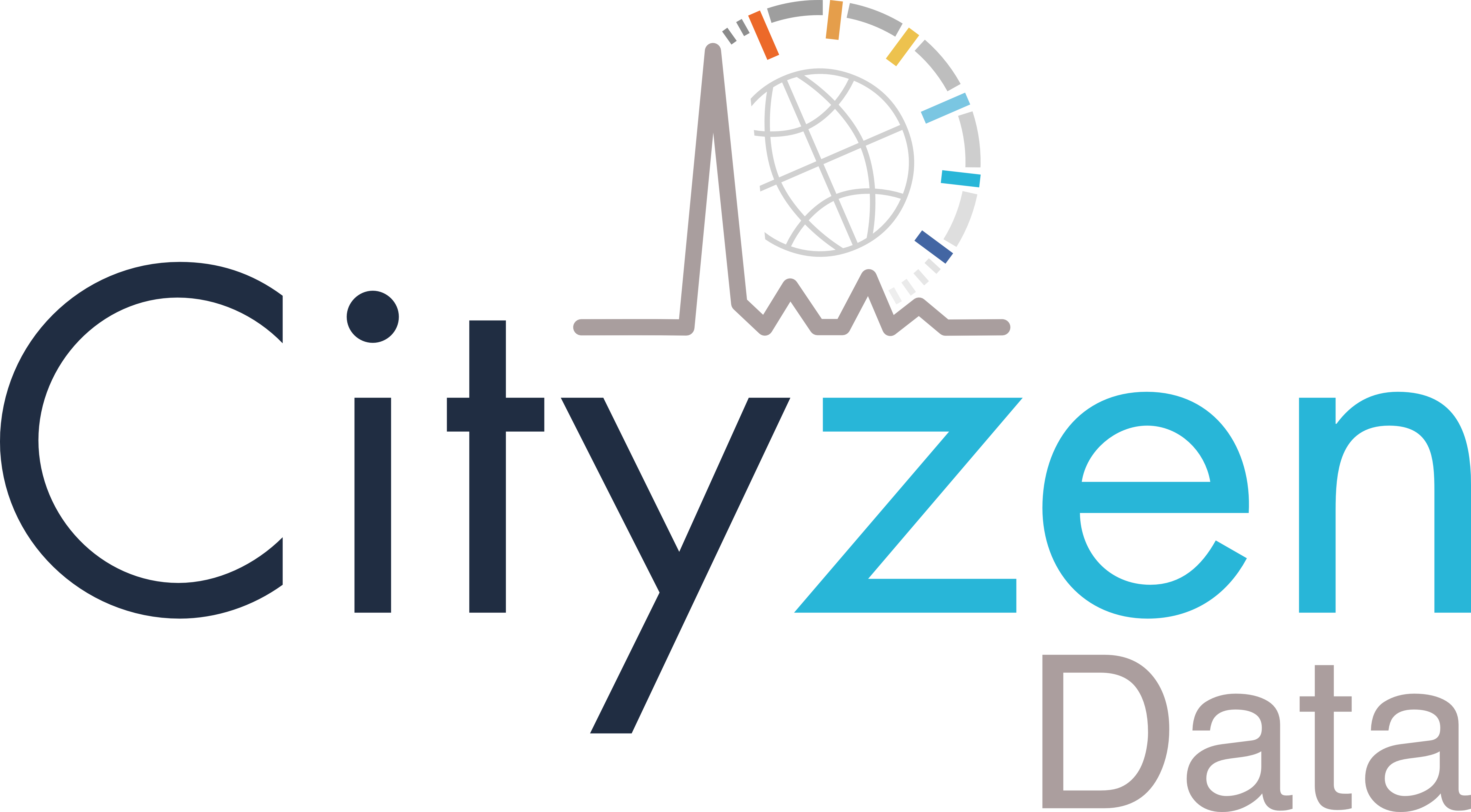
Cityzen Data was founded in 2013 and was born from the needs of the Smart Sensing consortium that created connected fabric used in sports garments. In close connection with Cityzen Sciences, Cityzen Data analyzes data for sport, health and wellness markets and, in this respect, has already strong connections, partnerships and clients in Europe, China and USA in such fields/markets. Cityzen Data addresses worldwide companies and SMEs to give value from new services that they can thus offer to their customers, users and patients. Cityzen Data’s goal is to provide a scalable, secure, ethical and open platform for sensor data that acts as an accelerator for any project.
Cityzen Data’s vision is to provide the most efficient platform to manage large volumes of IoT data. Through the bIoTope’s initiative, Cityzen Data has high expectations to improve its current ‘Continuum module » with the use of disruptive Big Data Analytics. Cityzen Data will also contribute to the objective to build the necessary adaptors for making its API compliant with the O-MI and O-DF standards and, furthermore, will also be involved in the cross-domain city pilot in Lyon.

Holonix is a spin off from Politecnico di Milano. The Company provides advanced ICT solutions based on the research outputs of the university researches. Holonix focuses on the Lifecycle Data and Knowledge Management, and its core solution is the “i-LiKe” (intelligent Lifecycle data and Knowledge) platform, which synthesizes the experiences and ideas from the last 8 years of research of Politecnico on Product Lifecycle Management. It is architecturally based on the achievements of several European projects and is composed of several modules, so the whole platform can be easily customized and satisfy different requirements of different customers such as, for example, logistic providers, production companies and assets management companies.
Holonix’s vision is to reinforce its commercial position as provider, through the iLike platform for connecting and tracking intelligent objects along their whole lifecycle. The platform offers a layer for interaction with external modules using the O-MI/O-DF and O-LM standards and for the development of customised UIs for the optimal and personalised access to the information. The iLike platform (and Virtual Obeya) will therefore integrate new functionalities and services developed in the overall bIoTope SoS platform, and for that, Holonix will support the development of services for data gathering from intelligent connected smart objects providing O-MI/O-DF-based APIs to access its the iLike platform. In addition, Holonix will extend and customised the Virtual Obeya, its solution for the creation of virtual rooms for collaborative discussions and decision-making.

itrust consulting is awarded « Start-up of the Year 2008 », at Luxembourg’s ICT awards, was created in January 2007 to consult public, financial, and industrial customers to protect their information against divulgation and manipulation. itrust applies innovation, participates in research projects (FP7, Celtic, ESA), and develops norms, security tools and information processing techniques, covering topics like Information Security Management Systems, risk management, Penetration testing, digital signature, cryptology, Internet security, Critical Infrastructure Protection, SCADA, Secure Localisation, CC, Computer Forensics.
itrust consulting will complement and work closely with Uni.lu on security and privacy aspects; itrust has several turnkey products and services that can be deployed or adapted to the bIoTope needs to tackle information security management systems, risk management, penetration testing, digital signature, or cryptology aspects. itrust will have a key role when investigating new Block Chain technologies and networks such as Bitcoin for « Safe Micro-Billing for IoT ».
Enervent Oy has manufactured ventilation units for 25 years. Enervent is owned by EM Group, which also owns Ensto Oy, a company that develops and manufactures electrical systems and accessories, including electrical heating and home automation systems. In 2013, Enervent launched its eAir product family, together with its eAir web service which natively includes Internet connectivity. The data and information collection possibilities offered by eAir web are expected to become competitive key factors in the future, where design and manufacturing faults can be detected more rapidly. Internet-connectivity also signifies new possibilities to adjust the control of Enervent’s products depending on the actual conditions in which they are used. Such adaptation can be performed e.g. by remotely updating control parameters or the control software, as well as by introducing new control methods that can adapt themselves.
Enervent’s vision is to maintain its position as a lighthouse manufacturer of energy-efficient ventilation and heat-recovery solutions. In 2013 Enervent launched its eAir product family. The data collection possibilities offered by eAir are expected to become competitive key factors in the future, where interoperability will facilitate the integrating of the Enervent’s products with other HVAC equipment and IoT information sources. Enervent’s goal is to gain important market shares by having some of the most advanced Smart Connected Products in the world and gain considerable profit from connectivity with IoT Platforms. Enervent will play a major role in the domain-specific pilot « Smart Building and Equipment Services (Proof-of-Concept) », where the bIoTope SoS platform will enable new forms of self-management building and equipment services.

ControlThings was founded in June 2010, and develops software for data acquisition from various sensing devices, typically embedded into physical products. ControlThings also performs data analysis and control of systems based on the collected information both locally and remotely. The main application domains of ControlThings are smart buildings and homes, building automation, remote monitoring and data acquisition from vehicles, RFID/NFC based applications, etc. ControlThings has developed several commercially available products in the Smart buildings and homes area, together with other companies, as well as living lab pilot installations in Finland and Sweden.
From the bIoTope perspective, CT’ vision is twofold: i) to develop a commercial-level platform based on principles of trust-based security, end-to-end encryption and distributed management of identities (CT will is developing a powerful distributed and secure protocol for the IoT called « WISH », integrating distributed identity management, secure authentication and certificate management and context-based access control; ii) to exploit results of bIoTope in customer projects where CT communication technology is embedded into the products. Using common API standards as O-MI and O-DF will make it possible to scale up the business infinitely as the bIoTope ecosystem emerge and gain markets with the help of high-visibility pilot installations in smart cities.
IS-practice is a Program Management Office that delivers project management and high-level advice in the broader field of the Information Society for major projects within the international and national public sector. It brings together specialized parties for ambitious research and consultancy projects. IS-practice is led by Hugo Kerschot, based on more than 20 years of experience in communication, IT, consultancy and project management in both the private and the public sector and multidisciplinary settings within the framework of the European Information Society. It calls its own an international network of experts in the development of innovative projects in the areas of, amongst others, eGovernment, eParticipation, eHealth, and eInclusion that make up Europe’s Knowledge Society. IS-practice works together with both large consulting organizations such as Capgemini and Deloitte Consulting as well as with smaller, highly specialized, companies in the fields of research, technology, and consultancy.
IS-practice will work closely with the Coordinator to assist with the project coordination and to take over day-to-day project management activities such as liaison with the EU Commission, budget management, meetings and conference call organization, quality assurance, risk management, and progress monitoring. IS-practice will also help to define and coordinate the Brussels pilot activities.
Forum Virium Helsinki is a non-profit enterprise owned by the City of Helsinki, established for research and development of digital services utilizing user-driven innovation methods and public/private collaboration. Forum Virium Helsinki is an innovation unit within the Helsinki City organization playing a key role in implementing Helsinki’s Smart and Open City strategy. The main goal of Forum Virium Helsinki is to develop the essential building blocks for smart, and open cities of the future. Forum Virium Helsinki has been at the forefront of the Open Data Movement over the last years, most obviously through the Helsinki Region Infoshare (HRI) project and its mission to open up public data from the Helsinki region to everyone, and is a member of the EIT ICT Labs and a founding member of the 300-member-strong European Network of Living Labs.
Forum Virium Helsinki will host and manage cross-domain Large-Scale Pilots developed in bIoTope. In this regard, Forum Virium Helsinki has good hands-on experience of and understanding of how apps-competitions and some other kind of open calls should be handled (see e.g. CreatiFI in the FIWARE open call phase, 99 SMEs competing), or Nordic Independent Challenge (also open call on innovation). Forum Virium Helsinki is particularly motivated by the 3rd bIoTope challenge, i.e. « Ecosystems of EU solution providers need to show their technical and commercial viability in Large-Scale Real-Life Pilot installations » and, to this end, will work closely with CKIR (Aalto Business School) to investigate new professional approach for ecosystem orchestration based both from the citizen learning/civic learning perspective at large (e.g. how to engage normal non-nerd-developer people in the IoT), or from the SME/Business exploitation perspectives.
On 1st January 2015, the Communauté Urbaine de Lyon became Grand Lyon La Métropole (Greater Lyon Urban Area Authority) by integrating the responsibilities of the Conseil Général du Rhône for its geographical area. It thus became the 1st local authority in France to be able, as single body, to implement social, economic, and local development responsibilities. Greater Lyon’s digital policy is turning towards a metropolis that innovates to ensure its citizens’ well-being. Since December 2009, Greater Lyon’s « digital mission » has included an approach dedicated to innovative services and uses, placing users at the center of its strategy for the city of tomorrow.
Greater Lyon will also host and manage one or several cross-domain pilots developed in bIoTope. Greater Lyon is particularly interested in scenarios such as i) Bottle Bank Management, ii) Street Lightening Optimisation, and iii) Hyperlocal Weather Data for Snow Cleaning, and sees a gold opportunity of creating a key IoT ecosystem in the Lyon region thanks to the Open Calls that enable to cope with the economic, industrial and social fabric and networks of Grand Lyon.
On 1st January 2015, the Communauté Urbaine de Lyon became IRISnet is the telecom operator of the Brussels Region network. All standard telecom services are provide through a state of the art IP network to the Brussels institutions. More than one thousand connections are managed by a professional team 24h/7D. IRISnet is created from a Private Public Partnership. All added value services are based on a strong relationship with Mobistar, a major Belgian telecom operator. IRISNET will provide the IoT networks and network control in the Brussels Capital Region. IRISNET will mainly contribute to the large-scale Brussels city Pilot, and particularly for identifying the most relevant pilots to be set up in Brussels. IRISNET will also play an key role in the Open Calls.

CIRB (Brussels Region Informatics Center), BRIC in English, is computerising the public authorities in the Brussels-Capital Region. CIRB helps these authorities to use ICT solutions to facilitate their own tasks and for the benefit of everyone in Brussels: citizens, businesses and the self-employed, as well as the public authorities. As a partner in the modernisation of the public authorities and services, CIRB is developing its range of IT services on the basis of integrated logic. In practical terms, the CIRB range comprises six groups of services: infrastructure, telecommunications, security, client support, hosting and sector solutions. In terms of Infrastructures, CIBG has a i) Regional Data Center to host IoT platforms; ii) Video Protection platform to get and process images related to mobility; iii) Irisnet broadband network to exchange data and video images, iv) URBIZONE Wifi network to collect data captured by Smartphones and other WiFi-enabled devices and sensors, v) ISR (Regional Services Integration, kind of ESB) to secure exchange of privacy-related data, and vi) Brussels UrbIS cartographic data and services to display maps and support spatial data analysis.
Brussels Mobility, is the administration of the Brussels-Capital Region responsible for equipment, infrastructure and mobility issues. The primary challenge is to facilitate economic development – and the growing need for mobility solutions – while improving quality of life and sustainable development. Brussels Mobility oversees the definition of mobility strategies, projects to develop, renew and maintain public spaces and roads, as well as public transport infrastructure and taxis of the Region. In doing so, it fulfils essential tasks to protect quality of life and sustainable development in the Brussels-Capital region, sometimes in partnership with other bodies. Brussels Mobility will be responsible for the specifications, development and follow-up of the Brussels pilots related to Mobility, in particularly: i) Brussels Open Call management, ii) Disclose Brussels traffic and mobility related data, iii) Ensure that utilities disclose the real-time position of their large vehicles, iv) Ensure that schools participate in the project.
References
| (Främling, 2014) | Främling, K.; Kubler, S.; Buda, A. (2014) Universal Messaging Standards for the IoT from a Lifecycle Management Perspective, IEEE Internet of Things Journal, vol. 1, n°4, pp. 319-327 |
| (O-MI, 2014) | The Open Group, « Open Messaging Interface Technical Standard (O-MI) », https://www2.opengroup.org/ogsys/catalog/C14B |
| (O-DF, 2014) | The Open Group, « Open Data Format Standard (O-DF) », https://www2.opengroup.org/ogsys/catalog/C14B |
